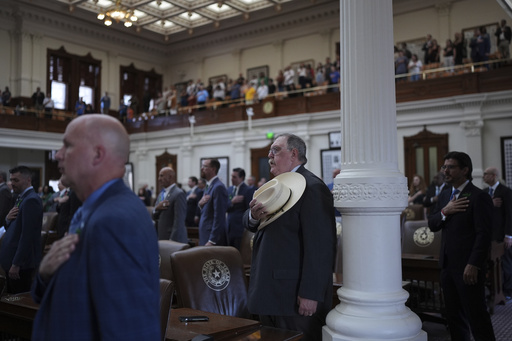AUSTIN, Texas — Texas Democrats gathered for a special legislative session on Monday, facing a critical decision about whether to walk out and disrupt the GOP-led initiative to redraw U.S. House maps. This move is part of a strategic effort by Republicans to safeguard their slender majority in the upcoming 2026 elections.
Former President Donald Trump is urging Republicans to create up to five additional congressional districts that are favorable to them in Texas. This ambitious and risky maneuver could strengthen their position before midterm elections, which traditionally see the party of the sitting president lose seats in the House.
Inside the Texas Capitol, Republican House Speaker Dustin Burrows called the 30-day session to order, establishing a committee to handle the increasingly contentious battle over the state’s voting maps. Although Democrats have vowed to oppose the redistricting, their minority status in the Texas Legislature limits their capacity to obstruct the process.
“Democrats will explore every option and take all necessary measures to defend our communities,” declared Democratic state Rep. Gene Wu of Houston, the leader of the House Democrats.
Republican Governor Greg Abbott has included redistricting among various issues he wants addressed during this special session. The session’s agenda also focuses on Texas’ severe flooding crisis, which has resulted in at least 135 casualties, bringing scrutiny to Kerr County officials for the perceived lack of advanced warnings to residents.
Abbott, who is serving his third term, invoked “constitutional concerns” raised by the Department of Justice regarding the redrawing of the maps, which is a decennial process. Their correspondence indicated that four districts within the Houston and Dallas metropolitan areas, which are predominantly Democratic, were subjected to racial gerrymandering in the 2021 redraw.
During discussions to kickstart the redistricting initiative, Republican Sen. Phil King, heading the committee, responded to inquiries from Democrats questioning the motivations behind the new mapping efforts.
“Today’s session is a response to the governor’s directive to address congressional redistricting,” King remarked. “I am confident that no legislation violating the Voting Rights Act will emerge from this committee or chamber.”
Democratic leaders have acknowledged that their limited options to counter redistricting efforts might include filibusters or walkouts that could deny Republicans the quorum necessary for proceedings. The Democrats argue that the proposed maps may disenfranchise their voters.
In 2021, Texas Democrats had a 38-day standstill at the Capitol by boycotting sessions in repulsion of suggested voting restrictions. Upon their eventual return, those measures were ratified. Republican Attorney General Ken Paxton has cautioned against walkouts, threatening arrests and a $500 daily fine for lawmakers who impede quorum.
Andrew Mahaleris, speaking on behalf of Abbott, abstained from commenting on the redistricting issue in a statement released on Monday. “While activists are preoccupied with political agendas, Governor Abbott focuses on delivering results that matter to Texans, such as addressing flooding issues, reducing property taxes, and eradicating the STAAR test,” Mahaleris stated, referencing the standard test for Texan students.
Concerns circulate that excessive gerrymandering could undermine Republicans by packing too many Democrats into Republican-leaning districts, potentially increasing the competitiveness of these areas. Additionally, the state faces lawsuits from civil rights organizations alleging racial gerrymandering in the 2021 maps.
Texas currently holds 38 congressional seats, with Republicans controlling 25 and Democrats 12, while one seat is vacant following the late Democratic Rep. Sylvester Turner’s departure. This seat is anticipated to be filled in an upcoming special election.
In a similar vein, Republicans in Ohio are contemplating redrawing their congressional maps, and California Governor Gavin Newsom has suggested similar moves in his state. However, in California, such authority is vested in an independent commission rather than the Democratic-led legislature.


